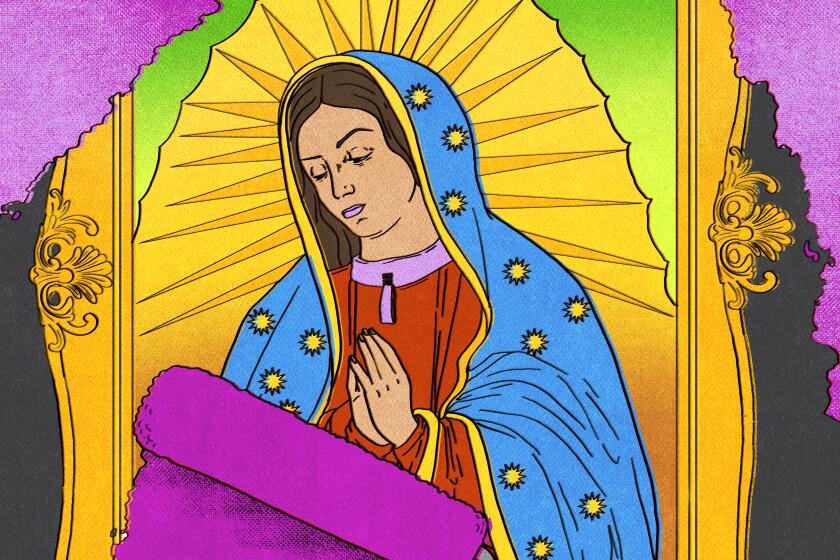
- Share via
Few words have soured for me like the word “toxic.” Paired with words like “masculinity,” it might sound like it’s saying something, but I’m not actually convinced it says much beyond “this broad category of social behavior is bad, just trust me.”
But when the question “Do Chicanos have a toxic gratitude problem?” was posed to me, it landed in an interesting way, perhaps because it’s something I’ve long suspected to be true but was never sure if it applied to any experiences beyond my own.
I still don’t like the term “toxic gratitude.” I’d rather call it something cooler, like “Si Dios Quiere Syndrome.” Much better. Regardless, the question still stands: Do Chicanos, or, I suppose one could also ask, do Latinos in the U.S. have a gratitude problem? In other words, are we too content with scraps? Do we fail to self-advocate in the workplace and beyond? And, if so, where does this issue stem from, and how do we overcome it?
A former gang member who left his criminal past behind, Richard Cabral has found success in Hollywood. His next move? A coffee shop in Pasadena.
It was during a recent chat with a friend and Chicana author when the subject of Si Dios Quiere Syndrome came up. She was negotiating her speaking fee for a gig at a university and told me how difficult she was finding it to muster the courage to counter their lowball offer. “You know,” she said, “it goes back to that whole toxic gratitude thing we grew up with.”
And indeed, I knew exactly what she meant. I spent a lot of time as a child at my abuelos’ house, eating with them, going on sweaty road trips to Texas with them, and listening to them talk to my aunts and uncles and cousins. They had very little money, despite a lifetime of hard work, including rigorous manual labor. But despite this, they were always stalwart supporters of the United States, true believers in the American dream, in the idea that if you worked really hard without complaining, you would be rewarded.
It’s a little funny to me, being a writer who gets invited to do panels with other Latino professionals and hearing myself and my peers be so critical of this country and its historic treatment of our elders. I think we have every right to do so, don’t get me wrong, but there’s an interesting element at play, or at least there is for me. So often, our elders are rendered in the imagination as long-suffering victims of capitalism who had to sacrifice greatly so that their grandchildren might live a better life. But it’s often the case that these elders do not share at all the same critical lens as their educated, relatively comfortable progeny. My abuela would be deeply confused by some of the positions I hold, to be sure.
Legendary manga artist Akira Toriyama died Friday. Among his work was the ‘Dragon Ball’ series, which has found mass success with Latino and Latin American audiences.
In my little world, I was raised by my abuelos to believe (despite the material evidence of their condition) that life was more or less fair, and it’s up to you to bust your ass and “make it” in this world if you want a better life for yourself and for your children, which you should, but you shouldn’t whine while you go about doing it. The trick is to keep your head down, do your work, prove yourself reliable, and the big guys at the top will eventually take notice, reach down, and lift you up a few rungs on the ladder.
Even in a relatively progressive Chicano household like mine, values were instilled in me about the nature of work and gratitude that I’m not sure are terribly helpful in our present economic environment. When I look at our economy, I see cushy jobs being handed out like party favors to people who all went to the same exorbitantly expensive schools while working-class jobs are increasing their demands of time and effort while shrinking in pay and in opportunities for upward mobility. I see a rigged system where gratitude only makes you easier to exploit, because you’re not one to raise a fuss and will do as you’re told until the company decides your job no longer needs to exist.
This has certainly been the case for me in my first few “big boy” jobs that weren’t food service or retail. When I finally landed my first writing gig where I was expected to churn out three articles a day for what’s come to be colloquially known as a “content mill,” I made sure that I overperformed despite being underpaid, because being both dependable and cheap was sure to make my boss happy with me and keep me from being fired.
The inclusion of a Colombian American drag queen has put the National Museum of the American Latino in jeopardy.
And, sure, unlike many of my colleagues, I wasn’t fired. But I also was never promoted or received any bumps in my pay despite my numbers being better than anyone else’s. I was promised several times that a raise was coming, I just needed to wait around a little longer, but the raise never came, and the company closed down, and I was unceremoniously told that I would need to go looking elsewhere for steady employment.
All the while, though, I didn’t pipe up, didn’t push anyone, because, well, I was glad someone had hired me to write at all. “Thank God I have a job,” I might have said at the time. Although I was doing dramatically different work from the kind my grandparents did, my attitude about work looked a lot like theirs.
Where does this come from?
It’s hard to ignore the elephant wearing the pope hat in the room. Catholicism does, after all, place a premium on suffering. I remember once in Catholic school when I injured my knee and I told a nun about it, her response was, “You might suffer the rest of your life,” but in an optimistic way. Suffering, in the Catholic framework of things, leads to salvation. It is through suffering that we are redeemed, like Jesus who suffered and died on the cross to cleanse us of our sins, and this idea permeates every aspect of life, including work.
Seeing Walter Mercado memorabilia being sold at the mall in Puerto Rico makes you think about what happens to queer icons.
It is also the case that, for many of our abuelos, there’s a narrative of hard-won triumph that undergirds their experiences and gives meaning to their many trials. No one wants to hear that they are being taken advantage of or that their toil didn’t mean anything. In the case of my abuelos, they had to fight tooth and nail to make a home for themselves here, and they overcame many hurdles on the way. That’s a powerful thing, and I understand not wanting to sully it with notions of victimhood.
But in a world where Chicanos continue to be underpaid and underrepresented in rooms where the big decisions are made, I have to wonder if this mind-set is really getting us anywhere. It’s complicated, though, because I simultaneously believe the goal shouldn’t be to mirror the systems that are presently keeping so many people at the margins, and it shouldn’t be to devalue manual labor jobs. Not everyone needs to be on a panel talking about representation. We need to find a way to bring dignity and proper compensation to the people who are working jobs that look like the ones my abuelos did.
At the same time, while I don’t have any easy solutions, I do think it would serve us well to recognize the reality of things. The system, the way it’s presently chugging along, isn’t fair. It doesn’t reward honest work, doesn’t reward displays of gratitude, and doesn’t care if you have a family to feed. It will cut you loose without remembering your name. All uninterrogated gratitude does is make it that much easier to feed you scraps, because you’ve made it abundantly clear you’re quite content with that.
The Latinx experience chronicled
Get the Latinx Files newsletter for stories that capture the multitudes within our communities.
You may occasionally receive promotional content from the Los Angeles Times.
There’s room for gratitude in our daily lives. On that front, my abuelos and I are in agreement. It makes me sad, actually, that we don’t live in a world where being grateful and not wanting to bother anyone by asking for too much is punished. But practicing gratitude has also brought many positive things to my life. It has allowed me to experience contentment and pride in the kind of professional I am. I care a lot about hard work, about the quality of my work, and I know, thanks to the values my family instilled in me, that I’m in it for much more than a paycheck.
But when it comes to self-advocacy and looking out for ourselves and for our communities in a turbulent economy, the philosophy of Si Dios Quiere does us few favors, because it’s not Dios pulling the levers at the top of this system. In fact, the system looks a lot like the kind of thing Dios explicitly disapproves of.
We should be willing to ask for more. We should be willing to demand better. And when we get it, we should be willing to lift our whole community up with us. That last part is of the utmost importance, as to neglect it is to accomplish nothing but perpetuate the status quo.
I like to think most of us were raised better than that.
More to Read
The Latinx experience chronicled
Get the Latinx Files newsletter for stories that capture the multitudes within our communities.
You may occasionally receive promotional content from the Los Angeles Times.











